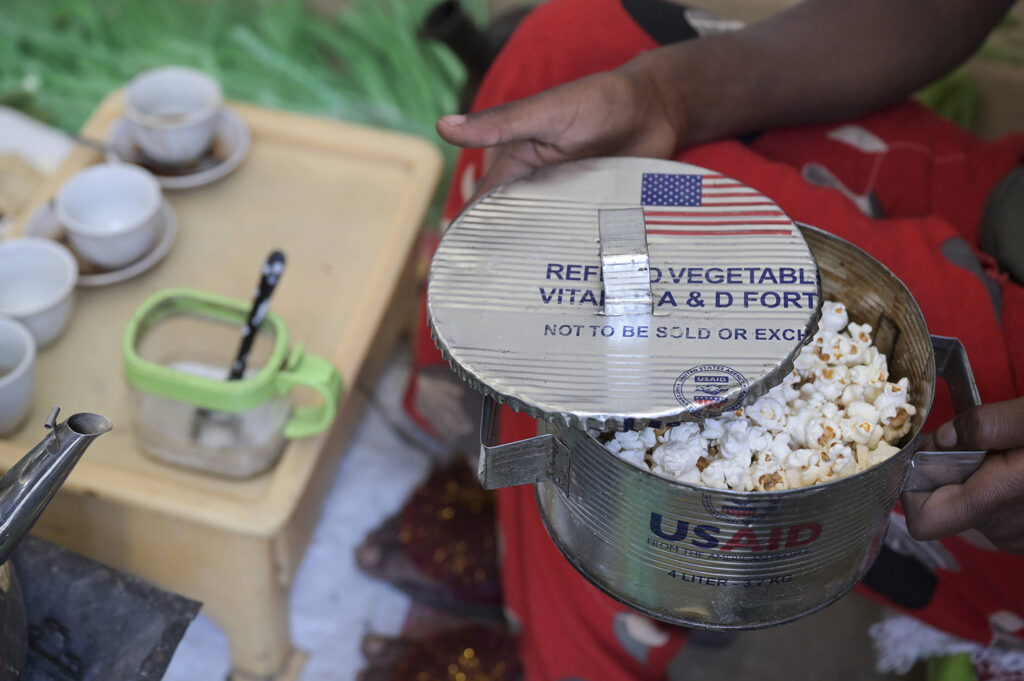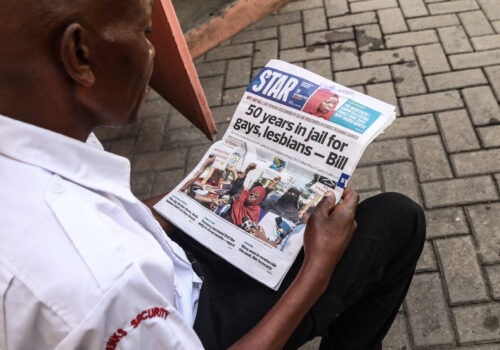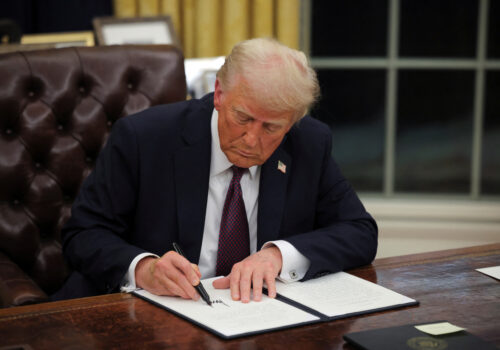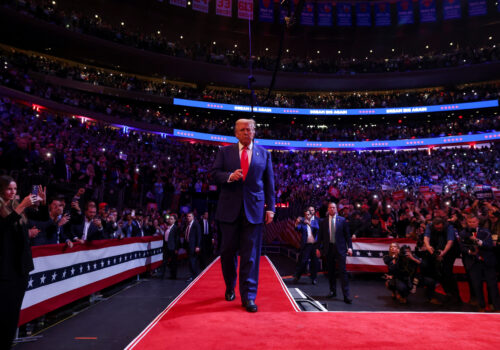The Trump administration’s efforts to dismantle the US Agency for International Development (USAID) have development analysts worried about the impacts on Africa. But Africans should take advantage of this moment to turn away from assistance and secure more economic self-reliance.
US President Donald Trump has sought to immobilize USAID as part of his mission to downsize the federal government. That mission also drove Trump to sign an executive order freezing foreign aid for ninety days and subjecting all aid programs to a review of whether they are aligned with US foreign policy, although exceptions include life-saving humanitarian assistance.
Since then, the administration has announced that it would merge USAID into the State Department, put thousands of staffers on paid leave, and order international staffers to return to the United States. Despite a few court rulings that have temporarily reinstated workers and funding for foreign-aid contracts, USAID—the largest humanitarian aid organization in the world—is now in pieces.
While many are assessing the Trump administration’s priorities and the consequences of the USAID shutdown for US competitiveness in the world, it is important to also consider the African perspective and analyze how Trump’s decision could shape Africa’s future.
Africa, the first victim?
Many are arguing that Africa will be the first victim of the USAID collapse. Even if the amount of USAID assistance to Africa has been decreasing over the past few years, the countries in Sub-Saharan Africa still received twelve billion dollars from USAID in 2024. Looking at the continent as a whole, Egypt, Ethiopia, Somalia, Nigeria, and the Democratic Republic of the Congo (DRC) receive the most aid.
The level of concern is high: From Sudan to the DRC, hundreds of millions of dollars’ worth of food and medicine, already delivered by US farmers and manufacturers, is stuck in ports due to the aid pause and confusion around unclear guidance from the government.
Foreign assistance to Africa has come to include aid with a variety of focuses, including economic development, health, peace and security, democracy and human rights, and education, going far beyond its primary goal. Some African leaders argue that such aid has led to interference in African internal affairs. In terms of efficiency, aid has never lifted any country out of underdevelopment, and the level of aid for Africa has been so low that it has never been able to meet the continent’s development needs. Nongovernmental organizations regularly deplore the fact that the development aid deployed by rich countries remains below the recommendations of the United Nations.
In addition, the full scope of aid to Africa has weakened focus on business and trade partnerships, which are more effective in combating structural underdevelopment. Moreover, for countries sending aid, such aid tends to be seen as a demonstration of influence and power rather than generosity. The power dynamic that is associated with aid—as exemplified by an African proverb that says “the hand that gives is always above the hand that receives”—has contributed to bias and prejudice against Africans, portraying them as eternally in need of charity. On the contrary, Africa draws in other forms of financing and investment, notably remittances from African diasporas (the amount of which surpasses funds received through development assistance or foreign direct investment). Money sent to Africa is increasingly coming from Africans themselves, not from foreign assistance. This is a promising path.
On fundamental issues, such as health, girls’ education, and security, Africa should not be dependent on foreign contributions, from the United States or elsewhere. As some African leaders have argued, the US freezing of federal aid is a “wake-up call” for the continent.
The concern about this dependence is not new: For decades, Africa observers have been warning about African dependence on perpetual external aid. Rather than replacing US aid with more assistance from other countries, Africa’s next efforts should be devoted to much more decisive policies. Such policies include ones that, for example, accelerate intra-African trade (which accounts for less than 20 percent of Africa’s total trade; for Europe, intra-regional trade accounts for 60 percent), support the introduction of sovereign currencies (the eco, a currency proposed for West Africa, has still not seen the light of day), or bring more local resource processing and technical and scientific training to the continent.
Offering a deal to Trump
Africans should not have waited for Trump to cut off economic development aid. They should have taken the lead and prioritized healthier cooperation, based on balanced and fair partnerships. Under Trump’s foreign policy, the United States is looking to put itself first; Africans, too, should be concerned about efficiency and should strive for foreign policy that puts their countries first.
Some African countries have made steps in this direction. With its Ghana Beyond Aid vision, Ghana had tried to revolutionize its policy under President Nana Akufo-Addo. Botswana has arguably already accomplished this shift, using revenues from its diamond industry to fuel a remarkable growth strategy.
Africans should support the US effort to evaluate its aid mechanisms; but more than that, they should take advantage of the end of USAID to propose new partnerships made up of direct investment and fairer trade. After all, African economies have assets and resources that few states in the world have on a large scale. Trump, the “dealmaker,” will likely welcome this approach.
Rama Yade is the senior director of the Atlantic Council’s Africa Center.
Note: Some Atlantic Council work funded by the US government has been paused as a result of the Trump administration’s Stop Work Orders issued under the Executive Order “Reevaluating and Realigning US Foreign Aid.”

The Africa Center works to promote dynamic geopolitical partnerships with African states and to redirect US and European policy priorities toward strengthening security and bolstering economic growth and prosperity on the continent.
Further reading
Thu, Feb 6, 2025
The United States needs a new guiding message in promoting LGBTQI+ rights in Africa: Tolerance
AfricaSource By Richard K. Bell
The United States should point to the fact that LGBTQI+ rights are, indeed, rights—and as is the case with rights, they have a legal basis.
Fri, Jan 24, 2025
Immigration looms large over US-Africa relations in 2025
AfricaSource By Alexander Tripp
Immigration will likely top the United States’ agenda in its relations with African nations in the months to come.
Tue, Oct 29, 2024
What Africa can expect under a second Trump administration: A focus on the ‘numbers’
AfricaSource By
The next Trump administration would likely seek to unleash as much energy from a growing young African population as possible.
Image: A photo from an IDP camp for internally displaced people due to the Tigray war. Photo by IMAGO/Joerg Boethling via Reuters Connect.



